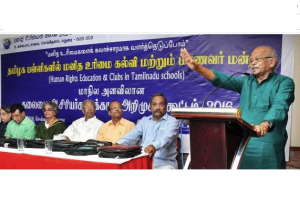EDUCATION FOR PEACE .
An article from The Hindu (copyright KSL, reprinted as non-commercial use)
The Institute of Human Rights Education’s (IHRE) initiative of forming Human Rights Clubs in schools is all set to be expanded in the ongoing academic year with 250 schools across 15 districts in Tamil Nadu getting to have the clubs by this year.

E. Devasagayam, Director, Institute of Human Rights Education, speaking on ‘Human Rights Education Clubs in Tamil Nadu Schools’ at Madurai on Tuesday.
Click on photo to enlarge
The initiative, started last year with the support of the School Education Department, already has ensured the functioning of the clubs in 120 schools across six districts in the State.
Speaking at a session here on Tuesday to introduce the initiative to Head Masters from schools across the State, Henri Tiphagne, executive director, IHRE, said the clubs already functioning since 2015 had proven to be considerably successful for students from Class 6 to Class 8.
He said in addition to having clubs, the curriculum designed for creating awareness of human rights would be taught to Class 6 students during class hours at least once a week.
“If you all want to see a Tamil Nadu without any caste-related or other human rights violations, it cannot happen through judiciary or police. But only through schools,” Mr. Tiphagne told headmasters, stressing the importance of imparting human rights related awareness to children.
Dissuading the concern raised by some of the participants that the initiative would encourage unruly behaviour among students in an already vitiated atmosphere, Aruna Rathnam, education specialist associated with United Nations Children’s Emergency Fund, said the experience so far had proven otherwise.
“Most of the issues that you associate with indiscipline in schools will go away if you teach children about human rights using the right approach. You cannot do it alone. You need to work hand-in-hand with students and other teachers,” she told the headmasters.
Pointing out the general anxiety towards any new initiative, K. Devarajan, former Director with School Education Department said he faced a similar problem when activity-based learning was introduced. “Initially, everyone was wary of it. Later they embraced it,” he said. “Lots of issues related to indiscipline arises only in schools where there is too much of control. Give adequate freedom and treat the children equally. You will then see the difference,” he said.
Highlighting the need for democratising education at all levels, I. Devasahayam, Director of IHRE, asked the participants not to discourage rebellious attitude of children since only such attitudes directed in the right manner had resulted in societal change towards equality.
J. Ponniah, Joint Director (National Service Scheme) of School Education Department, J. Angelo Irudayasamy, Chief Educational Officer of Madurai and P. Vijayakumar, former general secretary of Madurai Kamaraj, Manonmaniam Sundaranar, Mother Teresa and Alagappa University Teachers’ Association (MUTA) spoke.
(Thank you to the Global Campaign for Peace Education for calling this to our attention.)